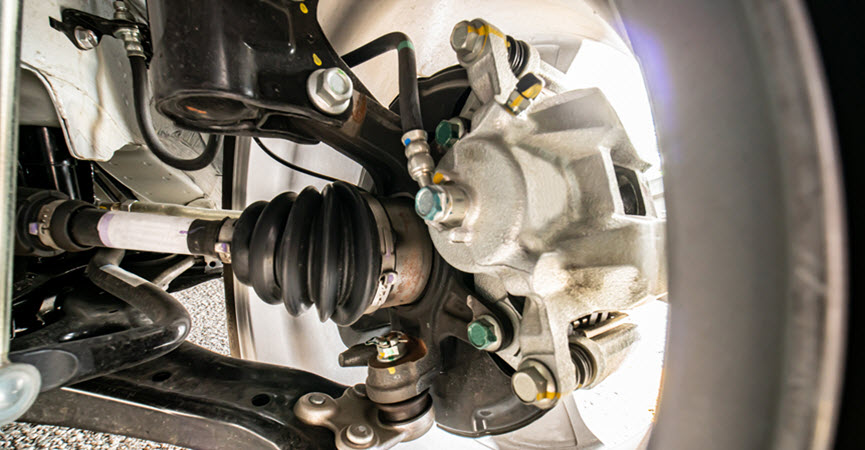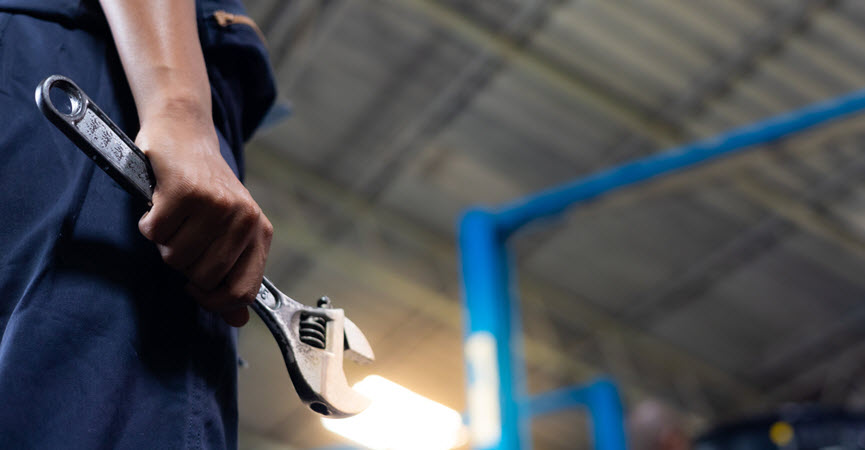
by Chris Limantour | Jan 28, 2024 | BMW Repair
When it comes to maintaining the optimal performance of your BMW, understanding the health of various components is crucial. One such component is the front tension strut bushing, often overlooked but vital for vehicle stability and handling.
Understanding Front Tension Strut Bushings
Before diving into the symptoms of failure, it’s important to understand what front tension strut bushings are and their role. These bushings, made of rubber or polyurethane, are integral parts of your BMW’s suspension system. They cushion and reduce friction between the metal parts of the suspension, aiding in absorbing shocks from road irregularities and contributing to a smoother ride.
Common Signs of Failure
- Unusual Noises: One of the first signs you might notice is unusual noises coming from the front of the vehicle, especially when driving over bumps or during turning. These can be clunks, creaks, or banging sounds. These noises occur because the bushing, which usually acts as a buffer, is worn out, causing metal-on-metal contact.
- Vibrations and Steering Wheel Shuddering: As the bushings wear out, you may feel vibrations through the steering wheel, particularly at higher speeds or when accelerating. This happens because the bushings are no longer effectively damping the vibrations from the road.
- Imprecise Steering: Worn bushings can lead to a lack of steering precision. You might find that your BMW doesn’t handle corners as well as it used to, or there’s a noticeable delay in steering response. This is because the bushings, which help maintain proper alignment of suspension components, are no longer performing effectively.
- Uneven Tire Wear: Another symptom of failed bushings can be uneven tire wear. Since the bushings help keep the wheels aligned, their failure can lead to misalignment, resulting in uneven wear on your tires.
- Visual Inspection: Sometimes, the bushing wear can be evident upon visual inspection. If you see cracking, tearing, or fluid leakage around the bushing, it’s a clear sign that they need to be replaced.
Why It Matters
Ignoring these signs can lead to more significant issues. Worn bushings affect the handling and stability of your BMW, which can compromise your safety. Additionally, the longer these problems are left unaddressed, the more likely they are to cause damage to other suspension components, leading to more expensive repairs.
Diagnosis and Repair
If you suspect your BMW has front tension strut bushing failure, the best course of action is to have it inspected by a qualified mechanic or a BMW specialist. They will be able to confirm the diagnosis and replace the bushings if necessary. It’s worth noting that the complexity of BMW’s suspension system often requires specialized knowledge and tools.
Preventive Measures
Preventive maintenance can help extend the life of your front tension strut bushings. This includes regular inspections, proper wheel alignments, and avoiding harsh driving conditions when possible. Additionally, being aware of the type of bushings your BMW uses can also be beneficial. For example, polyurethane bushings may offer longer life and better performance but may also come with a firmer ride compared to rubber bushings.
Maintain Your BMW’s Performance And Safety
Keeping an eye out for the signs of front tension strut bushing failure in your BMW is crucial for maintaining its performance and safety. Unusual noises, vibrations, steering issues, and uneven tire wear are key indicators.
Regular inspections and timely repairs are essential in preventing more significant issues down the road. By staying attentive to these signs, you can ensure your BMW continues to deliver the exceptional driving experience it’s known for.

Contact JCL Automotive Today
Contact us at JCL Automotive, situated in the heart of Hellertown, PA, for expert solutions to your BMW’s front tension strut bushing failure. Our team of specialized technicians is adept in handling this specific issue, ensuring that your BMW regains its optimal performance and smooth handling. The front tension strut bushing is crucial for maintaining the stability and alignment of your vehicle, and its failure can lead to uneven tire wear, poor handling, and an uncomfortable ride.
At JCL Automotive, we use state-of-the-art tools and genuine BMW parts to guarantee a high-quality repair. Don’t let a faulty front tension strut bushing compromise your driving experience. Reach out to us for professional, reliable service that restores your BMW to its pristine condition.

by Chris Limantour | Jan 11, 2024 | Mercedes Repair
Mercedes-Benz is renowned for its commitment to quality, innovation, and luxury in the automotive industry. While the German automaker consistently produces vehicles of exceptional craftsmanship, even the finest automobiles may experience issues over time.
One common problem that Mercedes owners may encounter is plastic guiderail failure. These guiderails play a vital role in the smooth operation of various vehicle components, and their failure can lead to a host of problems.
Signs Of Mercedes Plastic Guiderail Failure
1. Unusual Engine Noises
One of the initial signs of plastic guiderail failure in your Mercedes-Benz is the presence of unusual engine noises. These noises may manifest as clicking, rattling, or tapping sounds when you start the engine or accelerate. Plastic guiderails are typically found in the timing chain system, which is responsible for synchronizing the engine’s various components. When these guiderails begin to wear or break, they can cause the timing chain to lose tension, resulting in the aforementioned noises. Ignoring these sounds can lead to more severe engine problems, so it’s essential to investigate the issue promptly.
2. Reduced Engine Performance
A noticeable reduction in your Mercedes’ engine performance is another indication of plastic guiderail failure. As the guiderails deteriorate, they can negatively affect the engine’s timing and lead to a decrease in power and efficiency. You may experience a loss of acceleration, reduced fuel economy, and overall sluggish performance. This decline in engine performance not only affects your driving experience but can also lead to costly repairs if left unaddressed.
3. Check Engine Light
Modern Mercedes-Benz vehicles are equipped with sophisticated onboard diagnostic systems that can detect a wide range of issues, including plastic guiderail failure. When the system detects a problem related to the timing chain or guiderails, it will trigger the check engine light on your dashboard. Ignoring this warning sign can be detrimental, as it may indicate more extensive damage if the problem persists. It’s crucial to have the vehicle inspected and diagnosed by a qualified technician as soon as the check engine light illuminates.
4. Engine Misfires
Engine misfires can occur when plastic guiderail failure affects the timing chain’s operation. Misfires typically manifest as a noticeable vibration, hesitation, or loss of power while driving. If you experience any of these symptoms, it is essential to have your Mercedes-Benz inspected immediately. Ignoring engine misfires can lead to further damage and result in costly repairs.
5. Oil Leaks
Plastic guiderail failure can also lead to oil leaks in your Mercedes-Benz. The timing chain system relies on proper lubrication to function smoothly. When the guiderails fail, they can disrupt the oil flow to critical engine components, leading to leaks. Oil leaks are not only messy but can also be a fire hazard if the oil comes into contact with hot engine parts. Regularly check your vehicle’s oil level and look for any signs of oil leaks beneath the engine.
6. Rough Idling
If you notice that your Mercedes-Benz idles roughly or inconsistently, it may be a sign of plastic guiderail failure. The timing chain’s irregular operation can cause the engine to idle poorly, leading to a rough or unstable idle speed. This symptom can be particularly noticeable when the vehicle is stationary or at a standstill. Addressing rough idling promptly can prevent further damage and ensure smoother engine operation.
7. Reduced Fuel Efficiency
Plastic guiderail failure can impact your Mercedes-Benz’s fuel efficiency. When the timing chain system is compromised, it can lead to poor combustion and inefficient fuel consumption. If you notice a significant drop in your vehicle’s miles per gallon (MPG), it may be due to this issue. Lower fuel efficiency not only costs you more at the pump but also contributes to increased emissions and environmental impact.
Maintain The Performance And Longevity Of Your Mercedes
Recognizing the signs of plastic guiderail failure in your Mercedes-Benz is essential for maintaining the performance and longevity of your vehicle. Addressing these symptoms promptly can prevent further damage and costly repairs.
If you encounter any of these warning signs, it is crucial to schedule a diagnostic evaluation with a qualified Mercedes-Benz technician. Regular maintenance and timely repairs will ensure that your Mercedes-Benz continues to deliver the exceptional driving experience and reliability that it is known for.

Contact JCL Automotive Today
Contact us at JCL Automotive, conveniently located in Hellertown, PA, and entrust your Mercedes plastic guiderail repair to our skilled professionals. With our commitment to quality and expertise in Mercedes-Benz repairs, we are dedicated to ensuring the safety and longevity of your vehicle.
Don’t hesitate to reach out today, and let us provide you with exceptional service that exceeds your expectations. Your Mercedes deserves nothing less than the best, and at JCL Automotive, we deliver just that.
* Mercedes AMG Car image credit goes to: teddyleung.




